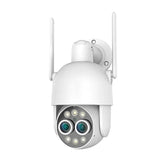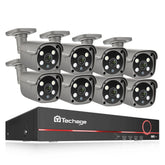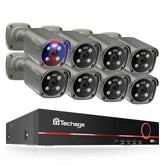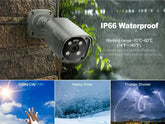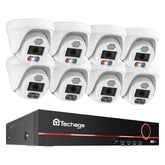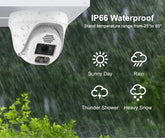Tips About Choosing A Reliable IP Camera System
With the increasing demand for surveillance solutions, selecting a reliable IP camera system has become crucial to ensure both security and peace of mind. Whether for residential or commercial use, investing in a dependable IP camera system can provide enhanced surveillance capabilities and mitigate potential risks. In this blog post, we will discuss key considerations and guidelines to help you make an informed decision when purchasing an IP camera system, ultimately enhancing security and instilling a sense of confidence.
Determine Your Security Needs:
Before investing in an IP camera kit, it's essential to assess your specific security needs. Consider factors such as the size of your property, the areas you want to monitor, and the level of detail required. Determine whether you need indoor or outdoor cameras, how many cameras you'll need, and if you require additional features like night vision, motion detection, or two-way audio. Understanding your security requirements will help you narrow down the options and choose a kit that meets your specific needs.
Research Reputable Brands and Vendors:
Thoroughly research and identify reputable IP camera brands and reliable vendors. Look for established manufacturers with a proven track record in the industry. Seek recommendations from security professionals, consult online forums, and read customer reviews to gauge the performance and reliability of different camera models and brands.
Consider Camera Resolution and Image Quality:
Camera resolution and image quality are critical factors to consider when selecting an IP camera kit. Higher resolution cameras capture more detailed images, allowing for better identification and facial recognition. Look for kits that offer at least 1080p resolution, but if you want even greater clarity, consider options with 4K resolution. Remember that higher resolution cameras may require more storage space for video recordings, so ensure your network and storage capabilities can accommodate the choosen resolution.
Low-Light Performance:
Consider the camera's low-light performance, especially if you require surveillance during nighttime or in poorly lit areas. Look for cameras with features like low-light sensitivity, infrared (IR) capabilities, or enhanced night vision. These features enable the camera to capture clear images even in challenging lighting conditions.
Assess Storage and Data Management:
Evaluate the storage and data management capabilities of the IP camera system. Determine if the system offers on-board storage options, cloud storage, or the ability to connect to a Network Video Recorder (NVR). Additionally, consider if the camera supports various compression formats to optimize storage space without compromising image quality.
IP camera kits typically offer different options for storing and managing video footage. Some kits come with built-in storage, while others require connecting to a Network Video Recorder (NVR) or cloud-based storage solutions. Evaluate the storage capacity and consider whether you prefer local storage or cloud-based storage for your recordings. Additionally, check if the kit offers features such as motion-triggered recording or scheduled recording to optimize storage space and ensure you have easy access to important footage.
Network Compatibility and Connectivity:
Ensure that the IP camera system is compatible with your existing network infrastructure. Look for cameras that support common protocols like TCP/IP and have built-in network connectivity options (such as Ethernet or Wi-Fi). This compatibility ensures seamless integration into your network environment and facilitates remote monitoring and access.
Explore Remote Monitoring Capabilities:
One of the significant advantages of IP camera kits is the ability to remotely monitor your home security. Look for kits that provide mobile apps or web-based interfaces that allow you to access live video feeds and recorded footage from anywhere using your smartphone, tablet, or computer. Ensure the kit is compatible with your preferred device and operating system. Additionally, check if the kit supports real-time alerts or notifications for events such as motion detection or tampering, so you can promptly respond to potential security incidents.
Security Features:
Prioritize the security features of the IP camera system. Look for cameras that support encryption protocols (e.g., TLS) to protect data transmission and prevent unauthorized access. Additionally, verify if the camera offers user authentication mechanisms, access control settings, and the ability to set password policies. These security measures help safeguard your camera system from potential breaches.
Scalability and Flexibility:
Consider the scalability and flexibility of the IP camera system. Determine if the system allows for easy expansion and integration with additional cameras or accessories as your needs evolve. Flexibility in camera placement options, such as adjustable mounts or the ability to rotate and tilt, enables you to optimize surveillance coverage.
Consider Scalability and Future Expansion:
While choosing an IP camera kit, think about your future needs and the potential for expanding your security system. Determine if the kit allows for adding additional cameras or integrating with other security devices such as door/window sensors, smart locks, or alarm systems. Scalability and compatibility with other smart home devices will ensure that your IP camera kit can adapt and grow alongside your evolving security requirements.
User-Friendly Interface and Management:
Choose an IP camera system with a user-friendly interface and intuitive management software. A well-designed interface simplifies camera configuration, monitoring, and playback. Additionally, consider systems that offer mobile apps or web-based interfaces for convenient remote access and management.
Warranty and Support:
Finally, evaluate the warranty and support provided by the manufacturer or vendor. Ensure that the camera system comes with a reasonable warranty period and reliable customer support. This ensures that any technical issues or concerns can be addressed promptly, minimizing downtime and maximizing system performance.
Conclusion:
Selecting a reliable IP camera system is crucial for improving security and instilling peace of mind. By determining your specific requirements, researching reputable brands and vendors,prioritizing image quality and low-light performance, considering storage and data management options, assessing network compatibility and security features, evaluating scalability and flexibility, prioritizing user-friendly interfaces, and reviewing warranty and support offerings, you can make an informed decision. Investing in a dependable IP camera system will not only enhance your security but also provide a sense of confidence in your surveillance capabilities.




